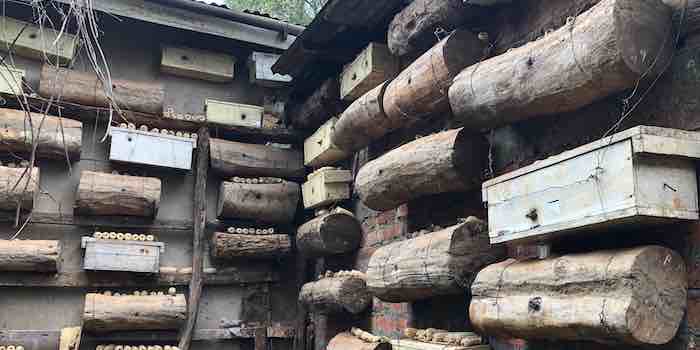African communities have long known the medicinal properties of stingless bee honey
The Original Medicine of Stingless Bees
 T
The American poet Emily Dickinson understood the profound gifts of nature. She wrote, “The lovely flowers embarrass me, They make me regret I am not a bee –”
If bees could speak, they might add, “Let me do my work, so that you may live.”
Bees are vital pollinators, ensuring the success of a wide variety of the world’s most nutritious agricultural crops grown for human consumption.
"Mother Medicine"
Most people associate bees with painful stings and the tasty product of the Western honeybee. Being “busy as a bee” is a homage to the industrious nature of this pollinating insect that collects nectar in a dozen or more foraging trips each day.
A small percentage of people who are stung by a bee or other insect quickly develop anaphylaxis, a potentially life-threatening severe allergic reaction that demands emergency treatment.
But not all bees sting. Within a niche field of entomology, the study of insects, scientists are studying a special tribe of bee species called stingless bees.
They are fascinating members of the animal kingdom, found in the countries located between the Tropics of Cancer and Capricorn, as well as the regions just north and south. Stingless bees are the source of a highly prized and distinct kind of honey that studies have shown to have antimicrobial, anti-inflammatory, and wound-healing properties.
Said to be the “Mother Medicine”, the matured nectar produced by native stingless bees includes chemicals that ward off microbial and fungal growth, an adaptation to keep the substance from spoiling in the tropics. Given the wide variety of plant biodiversity in the Amazon, and the incredible range of botanical chemicals the bees mix into their honey, it’s also no surprise it has medicinal value. The propolis, or gluey resinous mixture they use to seal their hives, is also prized.
Dr. Kathrin Krausa is a visiting scientist at the International Centre of Insect Physiology and Ecology. She and beekeeper Warren Steyn know where these special bee species can be found. Local beekeepers in Tanzania have successfully established thousands of colonies on the forested slopes of Mt Kilimanjaro and Mt Meru. That amounts to millions of bees producing enough of the highly prized, natural antibiotic to meet local demand and to facilitate the emergence of an export market. The industry is small, but the promise for subsistence farmers to get a start in business is large.
Stingless bee honey is better consumed by the teaspoon, as part of a natural health regimen
Said to be the “Mother Medicine”, the honey produced by stringless bees leverages nature’s remarkable biodiversity. “The matured nectar produced by native stingless bees includes chemicals that ward off microbial and fungal growth,” Krausa says.
Steyn appreciates the amount of delicate labour involved in the harvest. “Western honeybees will keep Winnie-the-Pooh stocked with pots of the gooey sweetness,” he says. “Stingless bee honey is better consumed by the teaspoon, as part of a natural health regimen.”
African communities have long known the medicinal properties of stingless bee honey. “They keep colonies as a first aid boxes next to their houses,” Steyn says.
But what’s so important about the biological qualities of a rare honey for people a world away? The emerging scientific literature on stingless bee honey offers evidence that the presence of enormously active chemical compounds produced by plants can hold significant therapeutic uses in diabetes and cancer treatments too.
Natural approaches are a good first line of defence against the development and treatment of disease. This outlook is paramount in sustaining a world that values biodiversity, questions the safety and side effects of pharmacological medicine, and takes reduction of waste, pollutants, and carbon emissions seriously.
W. Gifford-Jones, MD and Diana Gifford-Jones -- Bio and
Archives |
Comments
W. Gifford-Jones, MD is the pen name of Dr. Ken Walker, graduate of Harvard Medical School. Diana Gifford-Jones is his daughter, a graduate of Harvard Kennedy School. Their latest book, “No Nonsense Health” is available at: Docgiff.com
Sign-up at DocGiff to receive our weekly e-newsletter. For comments, .(JavaScript must be enabled to view this email address). Follow our new Instagram accounts, @docgiff and @diana_gifford_jones
.

 The American poet Emily Dickinson understood the profound gifts of nature. She wrote, “The lovely flowers embarrass me, They make me regret I am not a bee –”
If bees could speak, they might add, “Let me do my work, so that you may live.”
Bees are vital pollinators, ensuring the success of a wide variety of the world’s most nutritious agricultural crops grown for human consumption.
The American poet Emily Dickinson understood the profound gifts of nature. She wrote, “The lovely flowers embarrass me, They make me regret I am not a bee –”
If bees could speak, they might add, “Let me do my work, so that you may live.”
Bees are vital pollinators, ensuring the success of a wide variety of the world’s most nutritious agricultural crops grown for human consumption.